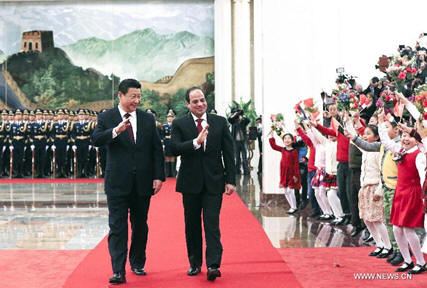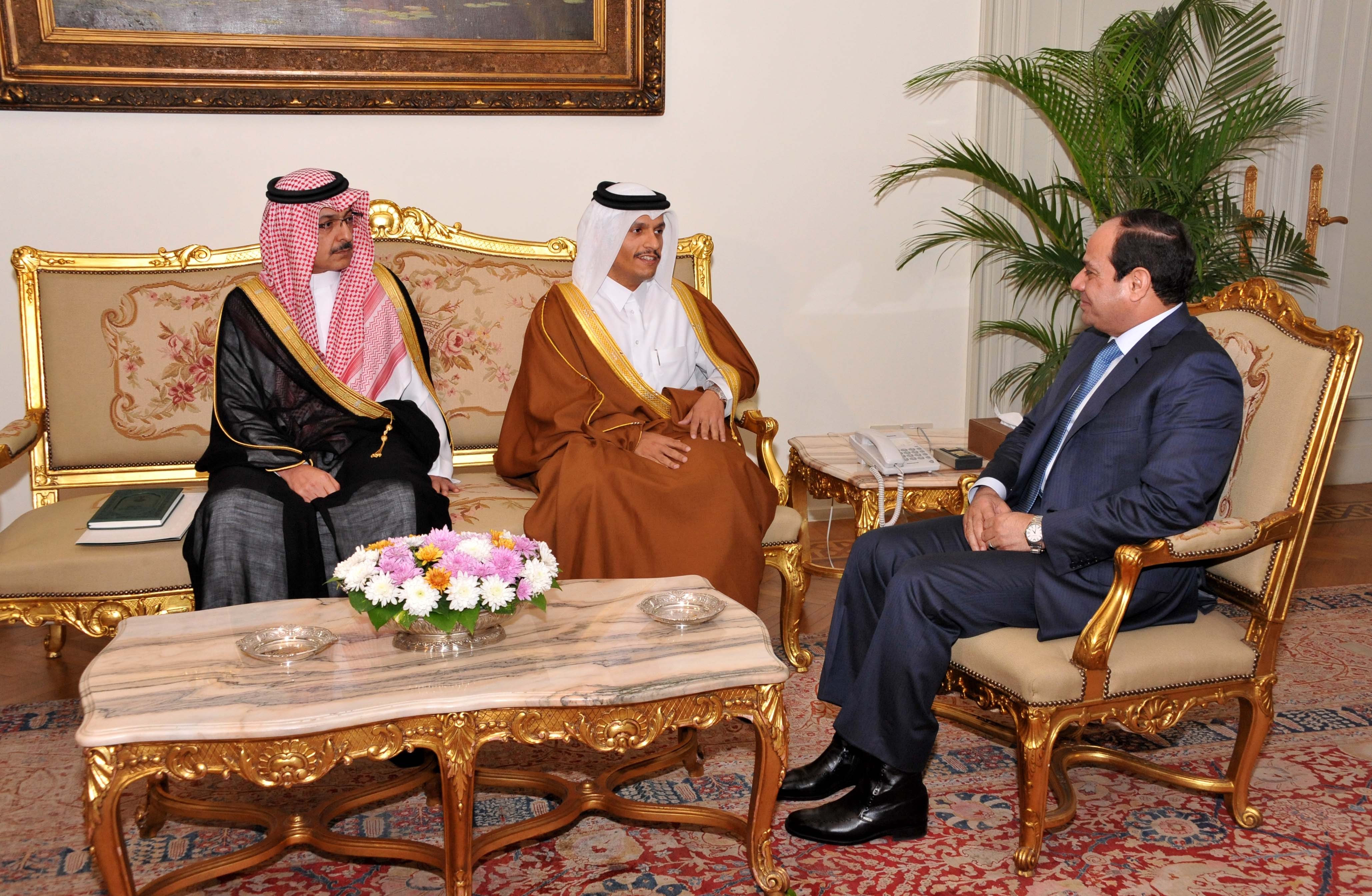www.aljazeerah.info
News, December 2014
Archives
Mission & Name
Conflict Terminology
Editorials
Gaza Holocaust
Gulf War
Isdood
Islam
News
News Photos
Opinion Editorials
US Foreign Policy (Dr. El-Najjar's Articles)
www.aljazeerah.info
|
Editorial Note: The following news reports are summaries from original sources. They may also include corrections of Arabic names and political terminology. Comments are in parentheses. |
Egypt Officially Re-instated in the World System, Receiving Support from US, China, and Qatar
December 23, 2014
 |
 |
|
Chinese President Xi Jinping welcomes visiting Egyptian President, Abdul Fattah Al-Sisi in Beijing, December 23, 2014 |
Egyptian President, Sisi, received Saudi envoy and chief of royal court Khaled al-Tuwaijiri, left, and Qatari envoy Mohamed bin Abdurrahman Al Thani, middle, ending Qatari-Egyptian rift. |
China, Egypt elevate bilateral ties to comprehensive strategic partnership
BEIJING, December 23, 2014 (Xinhua) --
Chinese President Xi Jinping held talks with visiting Egyptian President Abdel-Fattah Sisi in Beijing on Tuesday, deciding to elevate the bilateral relationship to a comprehensive strategic partnership between the two countries.
"This is an important milestone," Xi said during the talks.
The establishment of the partnership will strongly boost cooperation between the two countries in several areas.
In a joint statement signed by Xi and Sisi on establishing the partnership, the two presidents pledged to boost political, economic, military, cultural and technological cooperation along with cooperation on regional and international affairs.
China pays great attention to the situation in Egypt and firmly supports the Egyptians' pursuit for a development path suitable for their own national conditions, Xi told the Egyptian leader.
Xi said he believes the Egyptian government and people are wise and able enough to handle all problems and achieve stability and development in the country.
Hailing the traditional friendship between the two countries, Sisi expressed his gratitude for China's support and assistance, especially for understanding the Egyptian people's request for change in recent years.
The two leaders also pledged to cooperate on the Silk Road Economic Belt and the 21st-Century Maritime Silk Road Initiatives.
China stands ready to combine the initiatives with Egypt's plan for development and boost cooperation in infrastructure, nuclear power, new energy, aviation, finance and other sectors, said the Chinese president.
Sisi said the Belt and Road Initiatives proposed by Xi have provided an important opportunity for Egypt's renewal and that the Egyptian side will participate in the initiatives in an active way.
Sisi looked forward to China's participation in Suez Canal Corridor projects, pledging that Egypt will create favorable conditions to attract Chinese companies' investment.
In August, President Sisi gave the go-ahead signal for digging a 72-km expansion of the original Suez Canal as a national project to boost the country's ailing economy, ordering "the New Suez Canal" to be open for maritime navigation in early August 2015.
Sisi also hoped more Chinese tourists will visit Egypt as more Egyptian students study in China.
During the talks, Sisi briefed Xi on his view on the situation in North Africa and West Asia.
Xi said as the situation there is complicated, it is of vital importance to find a solution that reflects regional realities and cover the interests of all sides concerned in a political way and through inclusive dialogue.
In the joint statement signed on Tuesday, the two countries reiterated they will support each other on issues regarding core interests and care for each other's special concerns.
Egypt emphasized its stance of sticking to the one-China policy and China stressed its position of respecting the Egyptian people's rights to choose their political system and development policy on their own as well as opposing external forces' attempt to interfere in Egypt's internal affairs in any name.
China attaches great importance to Egypt's concern over water security, according to the statement.
In the statement, the two sides upheld that disputes between countries should be addressed through dialogue and negotiations, opposing interference into other countries' internal affairs with military forces in any name and politicizing issues on human rights.
The two sides pledged to safeguard the United Nations' key role in addressing international affairs and support reform of the United Nations and the UN Security Council.
The representation of developing countries, especially of African countries, should be strengthened first to rectify injustice that Africa has suffered in history, said the joint statement.
China supports Egypt's crucial role in resolving the Palestine issue and other major issues in the region as well as the Egyptian initiative on rendering the Middle East free of weapons of mass destruction. Egypt appreciates China's objective and impartial position and constructive role in the Palestine issue and other major issues in the region, according to the statement.
They pledged to increase coordination and cooperation to jointly safeguard peace and stability in the region, according to the statement.
Sisi arrived in Beijing Monday afternoon for a four-day state visit to China at Xi's invitation.
Egypt's Sisi meets Qatari envoy to fix ties
CAIRO/RIYADH, December 20, 2014 (Xinhua) --
Egyptian President Abdel Fattah al-Sisi met on Saturday with special envoys of Saudi King Abdullah bin Abdulaziz Al Saud and Qatari Emir Sheikh Tamim bin Hamad Al Thani on the Saudi initiative to fix the relations between Egypt and Qatar, official MENA news agency reported.
It is the first time for Sisi to meet with an envoy from Qatar since he took office in June, as relations between Cairo and Doha deteriorated over the overthrow of Egypt's former Islamist President Mohamed Morsi by the military in July, 2013.
Sisi discussed with Saudi envoy and chief of royal court Khaled al-Tuwaijiri and Qatari envoy Mohamed bin Abdurrahman Al Thani on the means of activating the Saudi initiative and the resolutions of the recent Riyadh summit, which expressed commitment of Gulf Cooperation Council (GCC) member states to supporting Egypt's security and stability and improving inter-Arab relations, particularly those between Egypt and Qatar.
"Egypt aims to a new era that puts the disagreements of the past behind. The sensitivity of the current stage requires giving priority to Arab unity and sincere efforts with a joint vision," MENA quoted Egyptian presidential spokesman Alaa Youssef as saying.
"President Sisi expressed appreciation of the sincere efforts of Saudi King Abdullah that aims for achieving unity and eliminating division among fellow Arab states based on mutual respect for the will of the peoples and non-interference in other countries' domestic affairs," the spokesman added.
The GCC states led by Saudi Arabia have recently reached an agreemenst in Riyadh to set forth a comprehensive framework for Arab solidarity and to overcome inter-Arab world disagreements, particularly with oil-rich Qatar.
Also on Saturday, Saudi Arabia said it welcomed the improvement of Egypt-Qatar ties, Saudi Press Agency reported.
In a statement, King Abdullah urged Egypt to support Qatar's return to the Arab fold, and appreciated the reconciliation efforts between the two countries to promote Arab unity.
After a recent agreement in Riyadh, Saudi Arabia, Bahrain and the United Arab Emirates agreed to return their ambassadors to Qatar who were withdrawn due to Doha's support of Morsi and his Muslim Brotherhood group, which is currently blacklisted by Egypt and Gulf supporters as "a terrorist organization."
Editor: Mu Xuequan
U.S. mends ties with Egypt by recovering military aids
by Marwa Yahya
CAIRO, Dec. 22 (Xinhua) --
Egypt received 10 Apache helicopters from the United States in the past week, state media said on Sunday, a sign of improving frozen ties between the long-time allies.
"The move will open window for gradual easing the tensions between Egypt and the United States, who both have common fears over terrorism threats in the Middle East region," said Ahmed Mahran, political professor at Cairo University.
The delivery of Apaches was also announced Sunday at the website of the U.S. embassy in Cairo, after the United States announced in April that it had decided to unfreeze military deals with the North African nation for "counterterrorism" efforts in the Sinai Peninsula.
The U.S. annually allocates some 1.5 billion U.S. dollars in aid to Egypt, including 1.3 billion dollars in military assistance.
The aids were frozen in October, 2013 after the military ouster of the country's first elected president Mohamed Morsi and subsequent crackdown on his supporters.
The United States, which led a coalition for fighting the Islamic States (IS) in Iraq and Syria, is concerned over the critical developments and divisions in the region that might lead to devastating war that would harm its interests in the Middle East, Mahran told Xinhua.
"Egypt for the west is a milestone for stability in the region," he added, given the fact that the most populous Arab country has been engulfed in militant insurgency which took from lawless Sinai a stronghold for attacking security forces.
The United States has blacklisted the most powerful militant group in Egypt, al-Qaida inspired Sinai-based Ansar Bayet al-Maqdis, which pledged allegiance to the IS and announced "Sinai State" in April.
On Thursday, U.S. Department of State designated another Egyptian militant group, Ajnad Masr "Soldiers of Egypt", as a terrorist group.
"This is recognition of U.S. that Egypt faces terrorist threats, not only over its borders with Israel and Libya but domestically," said Megahed Zayat, expert with Egypt-based National Center for Middle East Studies.
Designating the two extremist militant groups as terrorist by U.S. means United States back for Egypt's efforts in combating terrorism, Zayat told Xinhua.
According to Yousry el-Azabawi, an expert with Ahram Center for Political and Strategic Studies, "Egypt is a significant player in the international efforts in the war against the IS and the expansion of extremism in the region."
Logically, the ties between the two countries should signal improvement to face the terrorist groups, the IS in particular, Azabawi added.
By finishing its constitution and presidential elections, and with the parliamentary elections at doors, Egypt has made progress in the road map announced after the ouster of the Islamist leader Morsi, he added.
Azabawi expected "gradual and slow improvement in the two countries ties during the left two years in U.S. president Barak Obama's reign," arguing the relations needs years to restore the same strength it has during the time of Egyptian ousted president Hosni Mubarak, who was the U.S. main ally in the region and the basic guarantee for Israel security.
"Combating terrorism and economic development are two basic pillars to head towards the right track of relations," he added.
U.S. direct foreign investments came first in Egypt with 19.6 billion dollars in 2013, which is third of the total U.S. investments in Africa.
Another sign of rapprochement between the two countries was seen as the U.S. returned an ambassador to Cairo on Thursday, with Stephen Beecroft assuming his office, after 16-months absence of diplomat in the top job at the U.S. embassy in Cairo.
The post was previously held by Anne Patterson who left shortly after the ouster of Morsi.
On the same day as Beecroft's arrival, Sisi and U.S. president Obama discussed in a telephone conversation means of enhancing bilateral relations, and boosting cooperation in counterterrorism and regional security efforts including military and intelligence relations.
Editor: Tian Shaohui
***
Share this article with your facebook friendsFair Use Notice
This site contains copyrighted material the
use of which has not always been specifically authorized by the copyright
owner. We are making such material available in our efforts to advance
understanding of environmental, political, human rights, economic,
democracy, scientific, and social justice issues, etc. We believe this
constitutes a 'fair use' of any such copyrighted material as provided for
in section 107 of the US Copyright Law. In accordance with Title 17 U.S.C.
Section 107, the material on this site is
distributed without profit to those
who have expressed a prior interest in receiving the included information
for research and educational purposes. For more information go to: http://www.law.cornell.edu/uscode/17/107.shtml.
If you wish to use copyrighted material from this site for purposes of
your own that go beyond 'fair use', you must obtain permission from the
copyright owner.
|
|
|
|
||
|
||||||


